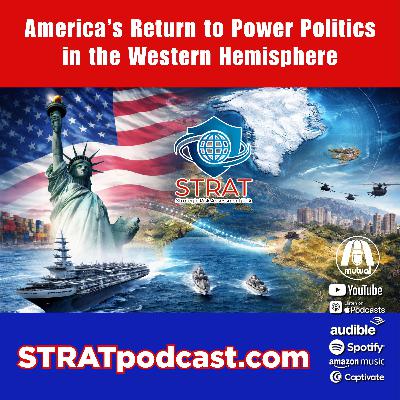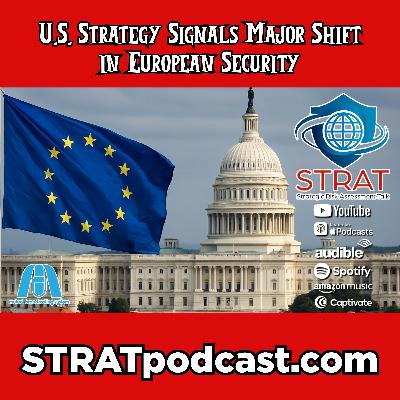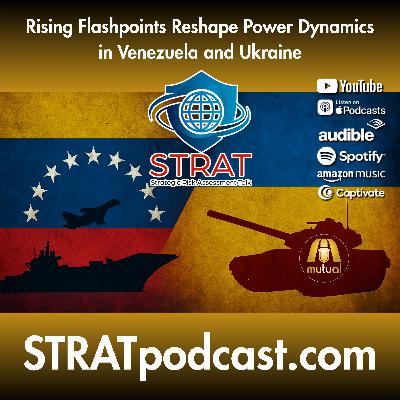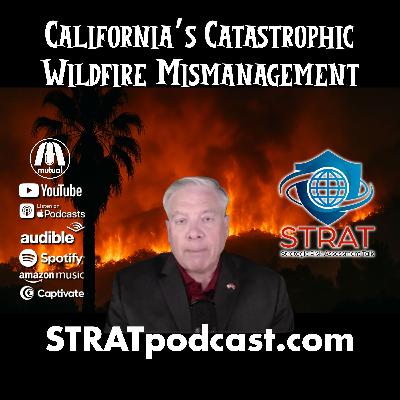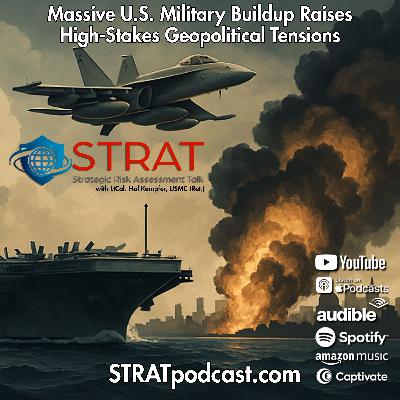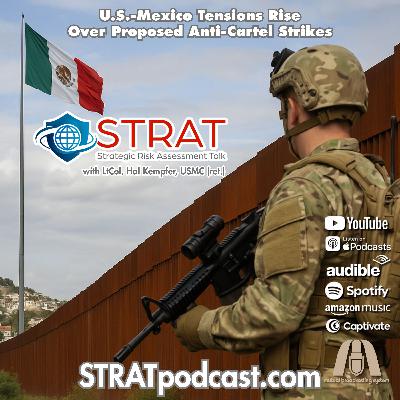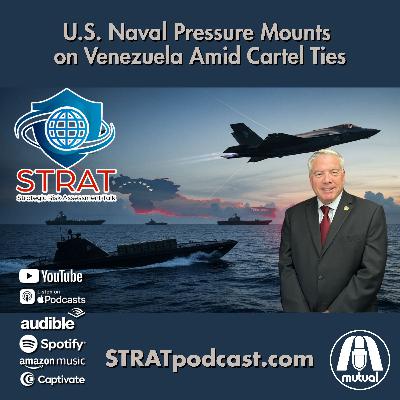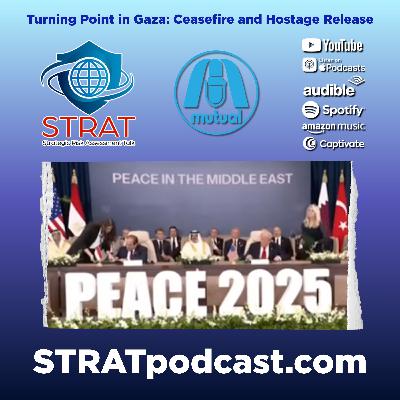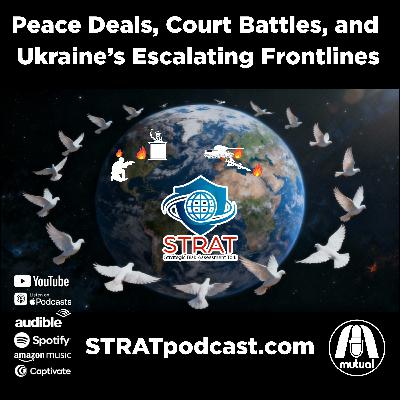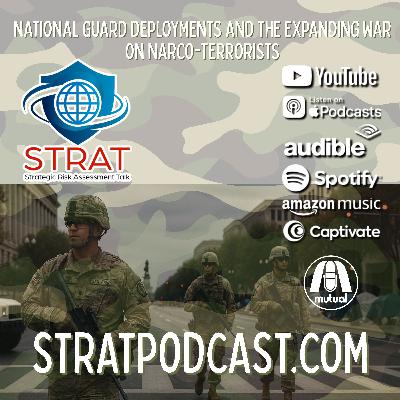Discover STRAT
STRAT

STRAT
Author: Mutual Broadcasting System LLC
Subscribed: 34Played: 512Subscribe
Share
© Copyright 2026 Mutual Broadcasting System LLC
Description
STRAT – Strategic Risk Assessment Talk, is a forum with a preparedness mindset. Mitigating risks, creating systems of prevention and recovery to deal with potential threats, and understanding the objectives of a Business Continuity Plan. This is the podcast for leaders who are committed to being prepared. The program is hosted by retired Marine Corps intelligence officer and strategic risk assessment professional Hal Kempfer and investment banker Mark Mansfield.
97 Episodes
Reverse
In this episode of STRAT with Hal Kempfer, we examine the growing likelihood of direct U.S. military action against Iran and what such a move would legally and strategically mean. The discussion explains why air or missile strikes would constitute an act of war under international law and reviews the historical context driving current tensions. We analyze the significant U.S. force buildup across the Middle East, including carrier strike groups, stealth aircraft, and AWACS deployments, and what these indicators suggest about operational intent. The episode also explores the strategic complications surrounding basing rights, particularly the role of Diego Garcia and allied political constraints. Finally, we assess Iran’s retaliatory capabilities, the risks of escalation, and the broader geopolitical consequences for Russia, China, and regional proxy networks. The central question: is striking Iran a necessary strategic move—or a high-risk gamble with global implications?Takeaways:U.S. strikes on Iran would legally constitute an act of warMajor U.S. force buildup signals serious operational preparationCarrier groups and stealth assets indicate potential escalationDiego Garcia access could complicate strike planningIran retains significant retaliatory capabilities across the regionProxy networks raise the risk of a wider regional conflictFailure to act carries its own long-term strategic risksPreventing Iranian nuclear capability remains a central concern#STRATPodcast #HalKempfer #MutualBroadcastingSystem #StrategicRiskAnalysis #USIranTensions #MiddleEastSecurity #Geopolitics #MilitaryStrategy #NationalSecurity #IranNuclearThreat #GlobalRisk #DefenseAnalysis #CarrierStrikeGroup #B2Bomber #AWACS #ProxyWarfare #HormuzStrait #StrategicForces #WorldAffairs #SecurityBrief
Global oil markets are no longer just about supply and demand—they are reshaping geopolitics in real time. In this episode of the STRAT podcast, retired Marine Intelligence Officer LtCol. Hal Kempfer breaks down how oil pricing and access are being used as strategic tools with far-reaching consequences. From pressure on Russia’s war economy to Iran’s vulnerability around the Strait of Hormuz, the ripple effects are global. The discussion explores how sanctions, tariffs, tanker seizures, and discounted crude are squeezing Russia’s revenues, pushing Cuba toward a full-blown energy crisis, and placing China in an increasingly precarious position due to its dependence on cheap oil from sanctioned states. Kempfer also explains key oil benchmarks like Brent and WTI, the importance of U.S. shale production, and why today’s environment differs fundamentally from past oil shocks. The result is a sober look at how energy strategy is quietly reshaping alliances, economies, and global stability.Takeaways:Oil prices are being actively shaped by U.S.-led strategyBrent and WTI benchmarks reveal critical geopolitical signalsRussia’s oil revenues are collapsing under sanctions pressureTanker seizures are disrupting sanctioned oil supply chainsThe Strait of Hormuz remains a major global choke pointCuba faces an unprecedented fuel collapse and instabilityChina’s reliance on discounted crude is becoming a liabilityEnergy pressure may accelerate regime change scenarios#STRATPodcast #HalKempfer #MutualBroadcastingSystem #StrategicRiskAnalysis #GlobalEnergy #OilMarkets #Geopolitics #EnergySecurity #RussiaUkraine #IranOil #ChinaEnergy #CubaCrisis #SanctionsPolicy #OilPrices #StrategicCompetition #NationalSecurity #EconomicWarfare #EnergyGeopolitics #GlobalStability #RiskAssessment
What would regime change in Iran actually look like—and what would it mean for the United States, Europe, and global stability? In this episode of STRAT with Hal Kempfer, we examine why many analysts believe the Islamic Republic is facing its most precarious moment since 1979. From reformist calls for constitutional change and unprecedented criticism in state-controlled media to debates over exiled versus domestic leadership, the cracks are becoming harder to ignore. We explore the rise of the Islamic Revolutionary Guard Corps as a dominant political and economic force, the risks of military escalation, and how foreign intervention could backfire by strengthening regime narratives. The discussion also addresses succession scenarios, the dangers of fragmentation or civil war, and why the Strait of Hormuz remains a critical pressure point for the global economy. Regime change, as this episode makes clear, is rarely clean or predictable—and what follows may be just as consequential as the fall itself.Takeaways:Iran faces its most unstable moment since the 1979 revolutionReformist figures are openly calling for political transitionState-controlled media criticism signals internal regime fracturesNo clear, unified leadership has emerged from the protest movementThe IRGC has evolved into Iran’s most powerful political actorMilitary strikes could unintentionally strengthen regime legitimacyControl of the Strait of Hormuz remains a global economic riskRegime collapse could lead to fragmentation or prolonged civil conflict#STRATPodcast #HalKempfer #MutualBroadcastingSystem #StrategicRiskAnalysis #IranRegimeChange #IranProtests #MiddleEastSecurity #IRGC #GeopoliticalRisk #USForeignPolicy #IsraelIran #GlobalOilMarkets #StraitOfHormuz #PoliticalTransitions #NationalSecurity #IntelligenceAnalysis #AuthoritarianCollapse #RegionalStability #StrategicForecasting #GlobalSecurity
From America’s heartland to the Pacific coast and the Middle East, this episode of STRAT examines three arenas where pressure is building—and consequences may be closer than many realize. Retired Marine Intelligence Officer Hal Kempfer begins in Minnesota, where aggressive federal immigration enforcement, violent street protests, and political resistance raise serious constitutional and legal questions, including the potential invocation of the Insurrection Act. The focus then shifts to California, where alleged large-scale fraud, sanctuary policies, and long-standing legal barriers to administering federal funds could place the state on a path toward fiscal insolvency and a showdown with Washington. Finally, attention turns to Iran, where reports of mass killings of protesters, societal collapse, and the movement of major U.S. naval assets raise the possibility of imminent military action. Together, these cases reveal how domestic unrest, financial integrity, and foreign conflict are increasingly interconnected—and why strategic risk is accelerating across the spectrum.Takeaways:Immigration enforcement is a core federal authority, not a novel policyMinnesota’s resistance mirrors past insurrection-era precedentsFederal agents are trained, but not optimized for mass civil unrestThe Insurrection Act remains a real, actionable optionFraud allegations may drive federal pressure on multiple statesCalifornia’s reliance on federal funding creates strategic vulnerabilityLongstanding legal rulings could jeopardize trillions in federal programsIran’s internal collapse may trigger rapid external military escalation#STRATPodcast #HalKempfer #MutualBroadcastingSystem #StrategicRiskAnalysis #ImmigrationEnforcement #InsurrectionAct #FederalAuthority #CivilUnrest #NationalSecurity #StateDefiance #CaliforniaCrisis #GovernmentFraud #FederalFunding #IranProtests #MiddleEastConflict #USMilitary #ConstitutionalLaw #Geopolitics #StrategicForecast #RiskAssessment
Protests and federal operations collide in Minneapolis after a fatal encounter between an ICE agent and a local resident. This episode of STRAT with retired Marine Intelligence Officer Hal Kempfer examines the surge of federal officers, the Minnesota National Guard’s mobilization, and warnings of possible troop deployments. We explore Governor and mayoral responses, crowd tensions, and how state and federal authority can clash in moments of crisis. STRAT’s insight frames the debate around immigration enforcement, public safety, and civil liberties. The show breaks down the Justice Department’s decision not to open a civil rights investigation and the DOJ resignations that followed. Listeners will hear historical comparisons to past uses of the Insurrection Act and what it could mean if invoked again. From law enforcement tactics to constitutional authority, this episode delivers context, analysis, and strategic perspective on one of the volatile stories in America today.Takeaways:Federal ICE operations in Minneapolis sparked large-scale protests.Minnesota National Guard was mobilized but not deployed to streets.Federal troops may be staged if unrest escalates further.Insurrection Act could allow military law enforcement roles.Local leaders criticize federal presence as an “occupying force.”DOJ declined a civil rights probe into a fatal ICE shooting.Multiple federal prosecutors resigned in protest.#STRATPodcast #HalKempfer #MutualBroadcastingSystem #StrategicRiskAnalysis #ICE #Minneapolis #Protests #NationalGuard #InsurrectionAct #Immigration #Federalism #CivilUnrest #LawEnforcement #DOJ #CivilRights #CrowdControl #NationalSecurity #BorderPolicy #FederalTroops #PublicSafety
This STRAT episode examines a rapidly escalating crisis in Iran and why it matters far beyond the Middle East. With protests spreading across more than 100 cities, a collapsing currency, and brutal crackdowns by the regime, Iran appears to be approaching a historic breaking point. The discussion with retired Marine Intelligence Officer Hal Kempfer explores how economic failure, mass arrests, and shocking levels of violence have shattered the long-standing social contract between the Iranian people and their rulers. The episode also looks at how recent military confrontations with Israel exposed major weaknesses inside Iran, fueling public anger and undermining regime legitimacy. Attention then turns to possible U.S. responses, the risks of military action, and the strategic dangers of retaliation across the Persian Gulf. Finally, the conversation explains why a potential regime collapse could reshape global energy markets, weaken Russia and China, and alter the world’s security balance—possibly becoming one of the most consequential geopolitical events of this century.Takeaways:Iran is facing its largest and deadliest protest movement ever.Currency collapse and economic shutdown triggered mass unrest.Israeli strikes exposed regime vulnerability and intelligence failures.The government responded with mass arrests and lethal force.Internet blackouts failed to fully hide the violence.U.S. action could help—or unintentionally strengthen the regime.Iranian retaliation would threaten U.S. and Gulf allies.Regime collapse could reshape global energy and power politics.#STRATPodcast #HalKempfer #MutualBroadcastingSystem #StrategicRiskAnalysis #IranCrisis #MiddleEastConflict #GlobalSecurity #EnergyPolitics #RegimeChange #Geopolitics #ProtestMovement #USForeignPolicy #ChinaEnergy #RussiaOil #PersianGulf #MilitaryStrategy #WorldAffairs #RiskAssessment #InternationalRelations #SecurityStudies
In this episode, retired Marine intelligence officer LtCol. Hal Kempfer analyzes the stunning overnight U.S. operation that led to the capture of Venezuelan president Nicolás Maduro and his wife, Cilia Flores. The mission—months in planning and executed with overwhelming air, cyber, space, and intelligence coordination—has sent shockwaves through Latin America and beyond. Kempfer breaks down what Operation Absolute Resolve reveals about modern U.S. military reach, strategic messaging, and escalation control. He explores the legal and moral implications of regime decapitation, the risks of attempting to “run” Venezuela, and the challenges posed by militias, rival governments, and global power competition. The conversation examines international reactions, the emergence of Delcy Rodríguez as acting president, and what this upheaval could mean for oil markets, refugees, Cuba, and regional stability. Finally, Kempfer assesses where this crisis may lead—and what Washington can realistically achieve next.Takeaways:The Maduro capture showcased integrated U.S. military, cyber, and intelligence powerOperation Absolute Resolve was designed for speed, shock, and strategic surpriseRemoving a regime is far easier than governing a fractured nation afterwardVenezuela’s military and militias pose major stabilization challengesGlobal reactions reveal shifting alliances and realpolitik calculationsOil access and sanctions remain central U.S. leverage pointsLegal justifications matter less than strategic consequencesThe crisis could trigger refugees, civil conflict, or regional escalation #STRATPodcast #HalKempfer #MutualBroadcastingSystem #StrategicRiskAnalysis #VenezuelaCrisis #MaduroCaptured #OperationAbsoluteResolve #USMilitary #Geopolitics #NationalSecurity #LatinAmerica #GlobalStability #EnergySecurity #RegimeChange #ForeignPolicy #IntelligenceAnalysis #TrumpDoctrine #CubaCrisis #StrategicStudies #WorldAffairs
In this episode of STRAT, retired Marine Intelligence Officer LtCol. Hal Kempfer breaks down the competing peace proposals aimed at ending the war in Ukraine and explains why each carries major strategic risks. The discussion examines a U.S.-backed 28-point plan that largely accommodates Russian territorial demands, Ukraine’s alternative 20-point framework emphasizing demilitarized zones and reconstruction, and Europe’s growing role as Washington signals limits to its long-term involvement. Beyond the battlefield, the episode explores Russia’s mounting economic strain, its struggle to sustain a war economy, and Ukraine’s increasingly effective deep-strike campaign against Russian infrastructure. The conversation widens to assess ripple effects across Europe and Asia, where allies like Japan and South Korea are rethinking defense self-reliance amid uncertainty over U.S. commitments. Ultimately, the episode asks whether peace is realistic.Takeaways:Proposed peace plans risk legitimizing territorial conquestUkraine rejects any deal surrendering sovereign landDemilitarized zones would require risky international enforcementEurope is accelerating defense independence from the U.S.Russian military faces equipment shortages and manpower strainUkrainian deep strikes are degrading Russia’s war economyGlobal allies are reassessing reliance on U.S. security guarantees#STRATPodcast #HalKempfer #MutualBroadcastingSystem #StrategicRiskAnalysis #UkraineWar #RussiaUkraineConflict #Geopolitics #GlobalSecurity #DefensePolicy #PeaceNegotiations #NATOSecurity #EuropeanDefense #WarEconomy #MilitaryIntelligence #InternationalRelations #AsiaPacificSecurity #StrategicStudies #RiskAssessment #ForeignPolicy #ModernWarfare
America’s strategic focus is shifting back to its own neighborhood. In this episode of STRAT with retired Marine Intelligence Officer Hal Kempfer, we examine how U.S. policy in the Western Hemisphere is evolving into what many call “Monroe Doctrine 2.0.” Drawing on history, current events, and hard geopolitical realities, the discussion explores renewed American assertiveness toward Greenland, Canada, the Panama Canal, and Venezuela. The episode traces the origins of U.S. hemispheric dominance, the legal and political legacy of past territorial ambitions, and how those precedents collide with today’s post-colonial world. It also assesses mounting military pressure near Venezuela, the risks of escalation, and the humanitarian consequences of regional conflict. With China, Russia, Iran, and Cuba all shaping the strategic environment, the United States faces difficult choices between action and restraint. This conversation highlights the dangers of unintended consequences and asks whether renewed hemispheric engagement can succeed where recent overseas nation-building efforts have failed.Takeaways:The Monroe Doctrine remains central to U.S. strategic thinking“Monroe 2.0” reflects renewed hemispheric assertivenessGreenland has long been considered strategically valuable to the U.S.Annexation rhetoric carries serious diplomatic consequencesPanama Canal treaties reshaped American power projectionVenezuela poses military, political, and humanitarian risksEscalation could destabilize the entire region through refugee flowsGreat-power competition heightens stakes in the Western Hemisphere#STRATPodcast #HalKempfer #MutualBroadcastingSystem #StrategicRiskAnalysis #MonroeDoctrine #WesternHemisphere #USForeignPolicy #Geopolitics #LatinAmerica #Venezuela #PanamaCanal #Greenland #ChinaRussiaIran #MilitaryStrategy #NationalSecurity #GlobalStability #PowerPolitics #UnintendedConsequences #HemisphericSecurity #ForeignAffairs
In this episode of STRAT, retired Marine Intelligence Officer LtCol. Hal Kempfer breaks down the newly released U.S. National Security Strategy and what it means for America, Europe, and the global balance of power. The Trump Administration’s document outlines a worldview driven by “flexible realism,” the revival of Monroe Doctrine thinking, and a call for Europe to change course or risk “civilizational erasure.” Kempfer explores the reaction across European capitals, from criticism by diplomats calling the strategy extreme, to growing tensions over migration, political identity, and NATO cohesion. We also examine how the U.S. is reasserting influence in the Western Hemisphere, reshaping relations with China, and potentially redefining support for Ukraine. As political alliances shift, Congress may form a new national security coalition that shapes U.S. foreign policy for years to come. Timely, controversial, and significant — this episode offers a clear look at a rapidly evolving world order.Takeaways:· The 2025 National Security Strategy marks a major policy shift.· Europe is warned of “civilizational erasure,” triggering backlash.· U.S. strategy encourages resisting Europe’s current political trajectory.· Washington plans renewed dominance in the Western Hemisphere.· Ukraine peace negotiations could involve territorial concessions.· China policy shifts toward economic competition over ideology.· Far-right influence in Europe receives positive recognition in the document.· Congress may realign into a new security coalition in response.#STRATPodcast #HalKempfer #MutualBroadcastingSystem #StrategicRiskAnalysis #NationalSecurity #Europe #ForeignPolicy #MonroeDoctrine #China #Ukraine #Congress #Geopolitics #WesternHemisphere #Migration #NATO #TrumpAdministration #Taiwan #Russia #WorldAffairs #GlobalStrategy
In this episode of STRAT, retired Marine Intelligence Officer Hal Kempfer examines two rapidly evolving geopolitical flashpoints—Venezuela and Ukraine—each perched at critical strategic inflection points. Venezuela faces mounting U.S. military and diplomatic pressure after President Trump’s declaration closing its airspace and the deployment of a powerful U.S. naval task force to the Caribbean. The situation places both Washington and the Maduro regime in precarious positions as covert operations, international legal concerns, and escalating cartel designations reshape the stakes. Meanwhile, Ukraine confronts a controversial peace plan that mirrors longstanding Russian objectives, raising fears about territorial concessions, regime change, and the future of Western commitment. With negotiations spanning Geneva to Washington and political turmoil in Kyiv, the outcome could redefine European security—while signaling broader implications for NATO, global alliances, and U.S. resolve in the Indo-Pacific. A complex and consequential moment is unfolding on both fronts.Takeaways:· Why U.S. pressure on Venezuela has reached a decisive point.· Strategic implications of closing Venezuelan airspace.· Capabilities and options of the U.S. carrier and MEU task force.· How cartel terrorist designations broaden potential U.S. target sets.· Concerns over reported Navy conduct and international law.· Why Ukraine’s proposed peace plan aligns closely with Russian aims.· How political instability in Kyiv and global negotiations shape outcomes.· Broader risks for NATO, Europe, and U.S. commitments worldwide.#STRATPodcast #HalKempfer #MutualBroadcastingSystem #StrategicRiskAnalysis #Geopolitics #NationalSecurity #VenezuelaCrisis #UkraineWar #USForeignPolicy #MilitaryStrategy #IntelAnalysis #RussiaUkraine #SouthAmericaSecurity #NATOAllies #GlobalStability #DefenseInsights #PolicyAnalysis #SecurityBriefing #InternationalRelations #RiskAssessment
California’s recent wildfire tragedies reveal far more than natural disaster—they expose deep failures in federal oversight, intelligence integration, emergency preparedness, and state-level accountability. In this episode, retired Marine Intelligence Officer Hal Kempfer examines why California continues to suffer catastrophic losses despite receiving substantial federal resources for prevention, mitigation, and consequence-management intelligence. Using the deadly Palisades fire as a case study, we break down allegations of state interference with firefighting operations, incomplete suppression of earlier burns, unfulfilled fuel-reduction promises, and years of misrepresented accomplishments in wildfire prevention. Kempfer also traces the history of federal all-hazards intelligence programs, how they were designed to support state and local decision-makers, and how California’s leadership rejected or redirected critical DHS-funded initiatives—hindering capabilities that could have saved lives and communities. Finally, Hal explores why a comprehensive, long-look federal investigation is urgently needed to address the systemic issues that span multiple administrations and continue to put millions at risk.Takeaways:· The Palisades fire exposed major failures in California’s fire-prevention and emergency-management systems.· New allegations suggest state officials may have limited key firefighting actions before the deadly blaze.· Investigations show California overstated wildfire-prevention accomplishments by hundreds of percent.· Fuel-reduction commitments were reduced or delayed despite repeated public claims of progress.· DHS-funded intelligence programs meant to support emergency operations were halted by state leadership.· California’s actions also affected other states seeking to implement all-hazards intelligence programs.· Comprehensive consequence-management intelligence could have reduced losses in multiple disasters.· A federal investigation—independent of DHS OIG—is needed to examine systemic misconduct across administrations.#STRATPodcast #HalKempfer #MutualBroadcastingSystem #StrategicRiskAnalysis #WildfirePrevention #EmergencyManagement #CaliforniaFires #PalisadesFire #HomelandSecurity #DisasterPreparedness #ConsequenceManagement #FederalOversight #CrisisResponse #WildfirePolicy #PublicSafety #IntelligenceAnalysis #EmergencyResponse #GovernmentAccountability #RiskMitigation #DisasterResilience
In this episode, retired Marine Intelligence Officer Hal Kempfer breaks down the newly announced Operation Southern Spear, a major U.S. military action aimed at targeting narco-terrorist networks in Latin America. With the USS Gerald R. Ford carrier strike group and an Amphibious Ready Group deploying to the region, the buildup represents one of the most significant demonstrations of American power in South America in generations. We examine what this force can actually do, what it can’t, and how its presence is being interpreted by Venezuela and regional actors. The episode also explores rapidly evolving Middle East diplomacy: the U.S. envoy’s potential meeting with Hamas leadership, Saudi-Israeli normalization talks tied to F-35 sales, and competing U.N. resolutions shaping the future of Gaza. Could these developments signal the emergence of a much larger geopolitical deal? We walk through the complexities, risks, and potential outcomes shaping the global landscape.Takeaways:Operation Southern Spear signals a major U.S. military escalation in Latin America.The USS Gerald R. Ford and Marine Expeditionary Unit form a powerful but non-invasion strike force.Venezuela accuses the U.S. of manufacturing pretexts for regional intervention.Debate intensifies over whether drug cartels meet the FBI’s definition of terrorist organizations.U.S. envoy’s planned meeting with Hamas sparks criticism over timing and intent.Saudi-Israeli normalization increasingly tied to F-35 sales and U.S. diplomatic leverage.Competing U.N. proposals reveal fractures over Gaza’s future and transitional governance.A potential “grand deal” may be forming across Latin America and the Middle East.#STRATPodcast #HalKempfer #MutualBroadcastingSystem #StrategicRiskAnalysis #OperationSouthernSpear #USMilitary #MiddleEastCrisis #VenezuelaTensions #GeraldRFord #MarineExpeditionaryUnit #GazaCeasefire #Hamas #SaudiIsraelNormalization #F35Deal #Geopolitics #NationalSecurity #DefenseAnalysis #MiddleEastPolicy #LatinAmericaSecurity #GlobalStrategy
In this episode of STRAT, retired Marine Intelligence Officer LtCol. Hal Kempfer examines the explosive proposal under consideration by the Trump Administration: U.S. military strikes against Mexico’s drug cartels. Kempfer explores how these criminal organizations dominate narcotics trafficking into the United States and perpetuate extreme violence and corruption in Mexico. He traces America’s long, complex military history south of the border—from the Mexican-American War to modern counter-narcotics cooperation—and unpacks how those memories shape today’s political and security dynamics. With reports of training and intelligence coordination already underway, and Mexico’s own government intensifying operations against the cartels, Kempfer dissects the strategic, legal, and geopolitical implications of a potential U.S. intervention. This episode sheds light on the razor’s edge between partnership and provocation—and what renewed military involvement could mean for both nations.Takeaways:· Mexican cartels are the primary suppliers of illicit drugs into the U.S.· “Plata o Plomo” encapsulates cartel violence and corruption.· The U.S. has a long and contentious military history in Mexico.· The Merida Initiative symbolizes modern cooperation but raises sovereignty concerns.· Intelligence-sharing between nations remains fraught with mistrust and complexity.· Trump Administration discussions involve potential covert and overt U.S. operations.· The CIA and Special Operations Forces may play a leading role under Title 50.· Any U.S. action risks rekindling deep Mexican sensitivities about foreign intrusion.#STRATPodcast #HalKempfer #MutualBroadcastingSystem #StrategicRiskAnalysis #Mexico #DrugCartels #NarcoTerror #USMilitary #TrumpAdministration #FentanylCrisis #BorderSecurity #MeridaInitiative #IntelligenceOperations #CIA #SpecialOperations #Title50 #Geopolitics #USMexicoRelations #NationalSecurity #CounterNarcotics
In this episode of STRAT, retired Marine Intelligence Officer LtCol. Hal Kempfer analyzes escalating U.S. military operations targeting fast boats and semi-submersibles linked to narcotics trafficking in the Caribbean and East Pacific. He explores the mounting tension between Washington and Venezuela as American naval and air forces, including F-35s and strategic bombers, position off the Venezuelan coast. With the Maduro regime accused of deep ties to the Soles cartels—designated as a terrorist organization—Kempfer examines how the U.S. is framing the mission under counterterrorism logic. He also discusses the geopolitical stakes, the weakness within Venezuela’s military, and whether growing U.S. actions could precipitate the fall of Nicolás Maduro’s government.Takeaways:· The U.S. has launched strikes on cartel-linked vessels in the Caribbean and East Pacific.· A Marine Expeditionary Unit and carrier task force are operating off Venezuela.· F-35s are based in Puerto Rico, signaling possible escalation.· The FAA’s extended airspace warning hints at planned operations.· Maduro’s regime is tied to the Soles and Tren de Aragua cartels.· U.S. actions may include leadership strikes if cartels equal terrorism.· Maduro’s fall could reshape Venezuelan politics and U.S. influence.· Strategic calculations suggest the U.S. cannot afford inaction.#USMilitary #Venezuela #MaduroRegime #DrugCartels #NarcoTerrorism #CaribbeanOperations #EastPacific #F35 #NavalStrike #Counterterrorism #WesternHemisphere #ForeignPolicy #MaritimeSecurity #Geopolitics #MilitaryStrategy #LatinAmerica #STRATPodcast #HalKempfer #MutualBroadcastingSystem #StrategicRiskAnalysis
On this episode of STRAT, we examine Ukraine’s FP-5 “Flamingo” cruise missile — a potentially game-changing long-range weapon now entering serial production. Retired Marine intelligence officer LtCol. Hal Kempfer walks through reported production rates, propulsion sourcing, warhead capabilities, and the strategic implications for Russian infrastructure and morale. We unpack claims about range, cost, and manufacturing scale; evaluate targets that suddenly fall within reach (refineries, rail chokepoints, weapons factories, command nodes); and consider how lower-cost mass production could reshape procurement and battlefield calculus. Discussion covers export and supply-chain angles, the possible US interest in the design or cost efficiencies, and political risks for Moscow if strikes reach population centers. Listeners will gain a clearer sense of how Flamingo changes deep-strike dynamics, what vulnerabilities Russia might face, and why industrialized, affordable cruise missiles matter to future warfare and deterrence. We end with policy options and scenarios.Takeaways:· Flamingo (FP-5) reportedly offers ~3,000 km range — deep-strike game changer.· Production is scaling quickly; Ukraine moving toward mass production capacity.· Unit cost reportedly far lower than US Tomahawk, enabling volume use.· Engines and components sourced creatively — raises proliferation and supply-chain questions.· Warhead options include bunker buster and cluster bomb units — wide target set.· 80–90% of Russian industrial targets could be within Flamingo range.· Strategic effects: strikes on refineries, rail, and weapons factories carry political risk for Moscow.· Wider implication: affordable cruise missiles could alter future procurement, deterrence, and escalation dynamics.#STRATPodcast #HalKempfer #MutualBroadcastingSystem #StrategicRiskAnalysis #FlamingoMissile #FP5Flamingo #UkrainianCruiseMissile #LongRangeStrike #DeepStrikeCapability #FirePoint #MissileProduction #LowCostCruise #CruiseMissileProliferation #RussianVulnerabilities #EnergyTargets #RailChokepoints #WarheadPenetration #PropulsionSourcing #MassedPrecisionFires #GeopoliticalConsequences
In this STRAT episode, retired Marine Intelligence Officer LtCol. Hal Kempfer breaks down three global and domestic flashpoints shaping today’s strategic landscape. First, he analyzes the latest diplomatic rift between Washington and Moscow, as talks between the U.S. and Russia collapse and Ukraine presses forward with new missile capabilities that could shift the balance of power. Next, Kempfer examines the fragile Gaza ceasefire, marked by violations, humanitarian struggles, and competing political agendas that threaten to reignite conflict. Finally, he unpacks a major Ninth Circuit Court decision authorizing the federalization of Oregon National Guard troops amid civil unrest — a ruling with profound implications for federal versus state authority. From Eastern Europe to the Middle East to America’s own legal battlegrounds, this episode offers critical insight into how military, legal, and geopolitical dynamics intersect in today’s complex world.Takeaways:· Russia’s demands in Ukraine remain unchanged despite diplomatic outreach.· The canceled Trump-Putin summit reflects rising U.S.-Russia tensions.· Ukraine’s domestic missile production could shift the war’s dynamics.· Flamingo missiles offer a cost-effective alternative to Tomahawks.· Gaza’s fragile ceasefire faces violations and humanitarian setbacks.· Hamas and Israel remain locked in a volatile political struggle.· The Ninth Circuit Court ruling reaffirms federal control of National Guard.· Historical parallels emerge between current federalization and 1960s civil rights crises.#UkraineWar #GazaCeasefire #MiddleEastCrisis #USPolitics #NationalSecurity #ForeignPolicy #MilitaryAnalysis #Geopolitics #GlobalAffairs #OregonNationalGuard #CourtDecision #TrumpAdministration #Putin #StateSovereignty #FederalAuthority #STRATPodcast #HalKempfer #MutualBroadcastingSystem #StrategicRiskAnalysis #DefenseInsights
In this episode of STRAT, retired Marine Intelligence Officer LtCol. Hal Kempfer examines one of the most pivotal developments in recent Middle East history—the ceasefire in Gaza and the release of Israel’s remaining live hostages. Kempfer analyzes how high-stakes diplomacy, coercive pressure, and regional alliances led to this breakthrough, and what challenges lie ahead in Phase 2 of the peace process. From Hamas’s disarmament and Gaza’s reconstruction to the possible normalization of relations between Saudi Arabia and Israel, Kempfer explores the complex military, political, and humanitarian implications shaping the region’s future. He also discusses how Gaza’s governance might evolve under a proposed Peace Board led by President Trump and Tony Blair. Tune in for expert insight into this critical moment and what it means for stability, peacekeeping, and long-term transformation across the Middle East.Takeaways:· The ceasefire and hostage release mark a major diplomatic breakthrough.· Intense pressure on both Israel and Hamas enabled the Phase 1 agreement.· President Trump and regional allies played key roles in securing terms.· Phase 2 involves disarming Hamas and ending its governance in Gaza.· A technocratic Palestinian body, possibly guided by Tony Blair, may oversee Gaza.· Reconstruction efforts will require international aid and regional investment.· Gaza faces deep social, infrastructural, and economic rebuilding challenges.· The deal could pave the way for Saudi-Israeli normalization.#STRATPodcast #HalKempfer #MutualBroadcastingSystem #StrategicRiskAnalysis #MiddleEast #GazaCeasefire #HostageRelease #Hamas #Israel #Trump #TonyBlair #PeaceProcess #GazaReconstruction #PalestinianAuthority #SaudiIsraelRelations #Diplomacy #IntelligenceAnalysis #Security #Geopolitics #Ceasefire
In this episode of STRAT, retired Marine Intelligence Officer Hal Kempfer examines three fast-moving global and domestic developments shaping today’s security landscape. First, Hal analyzes the new Gaza peace deal between Israel and Hamas — a fragile, phased agreement that could bring long-awaited hostages home but faces major hurdles in disarmament and governance. Next, he explores the Chicago federal court ruling halting National Guard deployments, unpacking constitutional questions and the broader implications for federal and state authority amid urban unrest. Finally, Kempfer provides a sharp situational update on Ukraine’s latest military actions, from deep strikes on Russian refineries to hybrid warfare operations across Europe. As global tensions intensify, Hal connects the dots between these stories to reveal what they mean for U.S. strategy, international stability, and the shifting balance of power worldwide.Takeaways:Israel and Hamas begin Phase I of a U.S.-backed peace deal.Hostage releases and troop withdrawals mark fragile first steps in Gaza.Phase II disarmament and governance talks could easily collapse.Chicago court halts National Guard deployment, citing constitutional concerns.Federal vs. state control of troops faces renewed legal scrutiny.Ukraine expands deep strikes on Russian targets and refineries.Russia’s economy and military momentum continue to falter.European nations brace for hybrid warfare and political realignments.#STRATPodcast #HalKempfer #MutualBroadcastingSystem #StrategicRiskAnalysis #GazaPeaceDeal #IsraelHamasCeasefire #NationalGuard #ChicagoRuling #UkraineConflict #RussianEconomy #HybridWarfare #GlobalSecurity #USMilitary #Ceasefire #HostageRelease #InternationalLaw #DefenseAnalysis #Geopolitics #CivilMilitaryRelations #WorldAffairs
In this episode, retired Marine Intelligence Officer Hal Kempfer examines the Trump administration’s fast-paced 2025 deployments of federalized National Guard troops to major U.S. cities. Framed by the Administration as a strategy to combat crime, immigration, and homelessness, the move has sparked nationwide debate over the use of the military and testing the limits of federal intervention in the homeland. From Los Angeles to Washington, D.C. and from Portland and Memphis, these deployments are redefining the balance of power between state and federal authority and spotlighting a “loophole” within the Posse Comitatus Act, wherein active-duty National Guard troops under federally funded Title 32 status are working for the state and potentially performing missions that are prohibited to federal troops under federal law. At the same time, President Trump has declared Mexican drug cartel members as ‘unlawful combatants’, signaling a dramatic shift in how these cartel members are to be handled, and coinciding with an expansion of U.S. military engagement in the Western Hemisphere.Takeaways: • National Guard deployments expanded from Los Angeles to Washington, D.C., and beyond. • Federal troops tasked with supporting ICE in logistics and enforcement. • Governors divided: some request support, others challenge deployments in court. • Legal disputes center on Posse Comitatus and Title 32 authority. • Oregon sued over deployments, citing risks to public safety. • Trump declares cartel members as “unlawful combatants,” putting them in the same status as Al Qaeda • Parallels drawn to post-9/11 legal precedents and controversies. • Growing shift of U.S. military focus to Western Hemisphere threats. #STRATPodcast #HalKempfer #MutualBroadcastingSystem #StrategicRiskAnalysis #NationalGuard #TrumpAdministration #BorderSecurity #ImmigrationEnforcement #PosseComitatus #Title32 #USMilitary #DrugCartels #UnlawfulCombatants #HomelandSecurity #FederalOverreach #PublicSafety #DomesticDeployment #WarPowers #TransnationalCrime #WesternHemisphere










